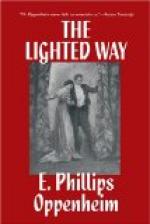Arnold shook his head.
“No, I don’t think so,” he admitted simply. “To tell you the truth, I think that it was the actual presence of the picture here, rather than its suggestions, which interested me most. Your room is so masculine,” Arnold added, glancing around. “It breathes of war and sport and the collector. And then, in the middle of it all, this girl, with her barely veiled limbs and lascivious eyes. There is something a little brutal about the treatment, don’t you think?”
Sabatini shrugged his shoulders.
“The lady is too well known,” remarked Sabatini, shrugging his shoulders. “A single touch of the ideal and the greatness of that picture would be lost. Greve was too great an artist to try for it.”
“Nevertheless,” Arnold persisted, “she disturbs the serenity of your room.”
Sabatini threw away his cigarette and passed his arm through his companion’s.
“It is as well always to be reminded that life is many-sided,” he murmured. “You will not mind a tete-a-tete dinner?”
Some curtains of dark green brocaded material had been silently drawn aside, and they passed into a smaller apartment, of which the coloring and style of decoration was the same. A round table, before which stood two high-backed, black oak chairs, and which was lit with softly-shaded candles, stood in the middle of the room. It was very simply set out, but the two wine-glasses were richly cut in quaint fashion, and the bowl of violets was of old yellow Sevres. Arnold sat opposite his host and realized how completely the man seemed to fit in with his surroundings. In Mrs. Weatherley’s drawing-room there had been a note of incongruity. Here he seemed so thoroughly in accord with the air of masculine and cultivated refinement which dominated the atmosphere. He carried himself with the ease and dignity to which his race entitled him, but, apart from that, his manner had qualities which Arnold found particularly attractive. His manicured nails, his spotless linen, his links and waistcoat buttons,—cut from some quaint stone,—the slight affectations of his dress, the unusual manner of brushing back his hair and arranging his tie, gave him only a note of individuality. Every word he spoke—and he talked softly but continually during the service of the meal—confirmed Arnold’s first impressions of him. He was a man, at least, who had lived a man’s life without fear or weakness, and, whatever his standards might be, he would adhere to them.
Dinner was noiselessly and perfectly served by the butler who had first appeared, and a slighter and smaller edition of himself who brought him the dishes. There was no champagne, but other wines were served in their due order, the quality of which Arnold appreciated, although more than one was strange to him. With the removal of the last course, fruit was placed upon the table, with a decanter of Chateau Yquem. On a small table near was a brass pot of coffee and a flask of green liqueur. Sabatini pushed the cigarettes towards his companion.




